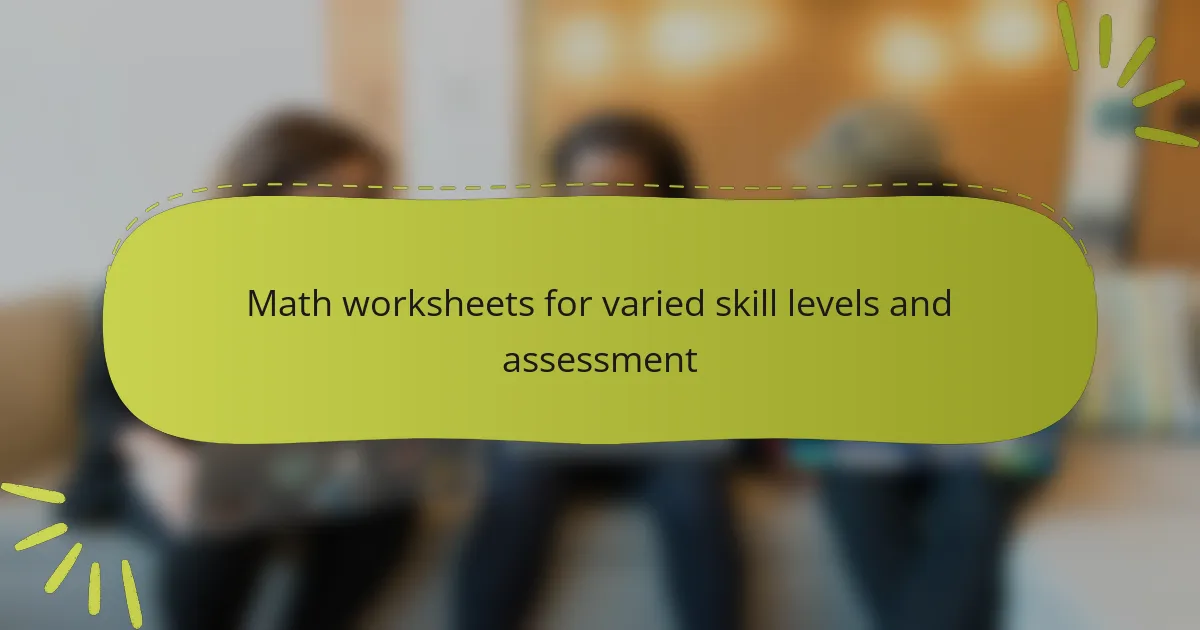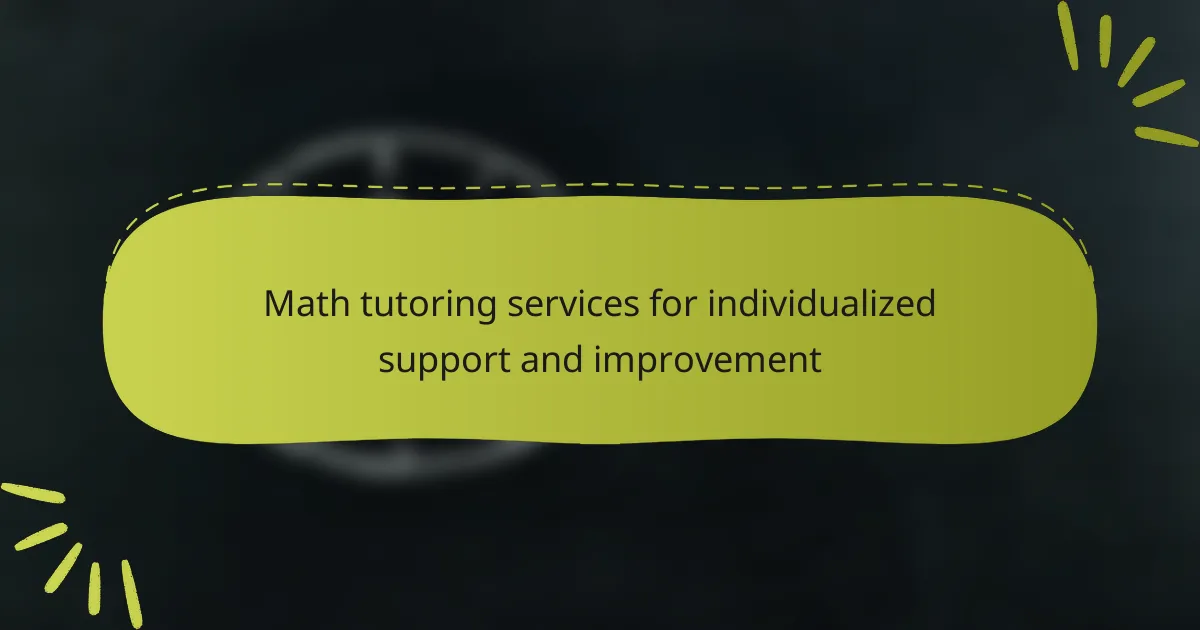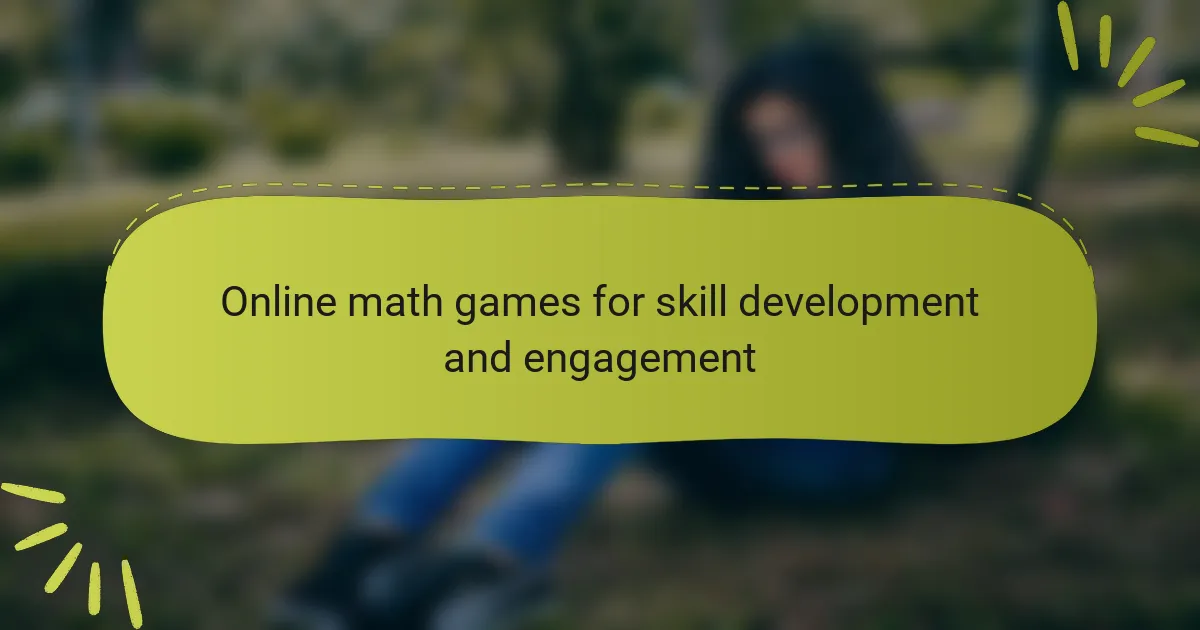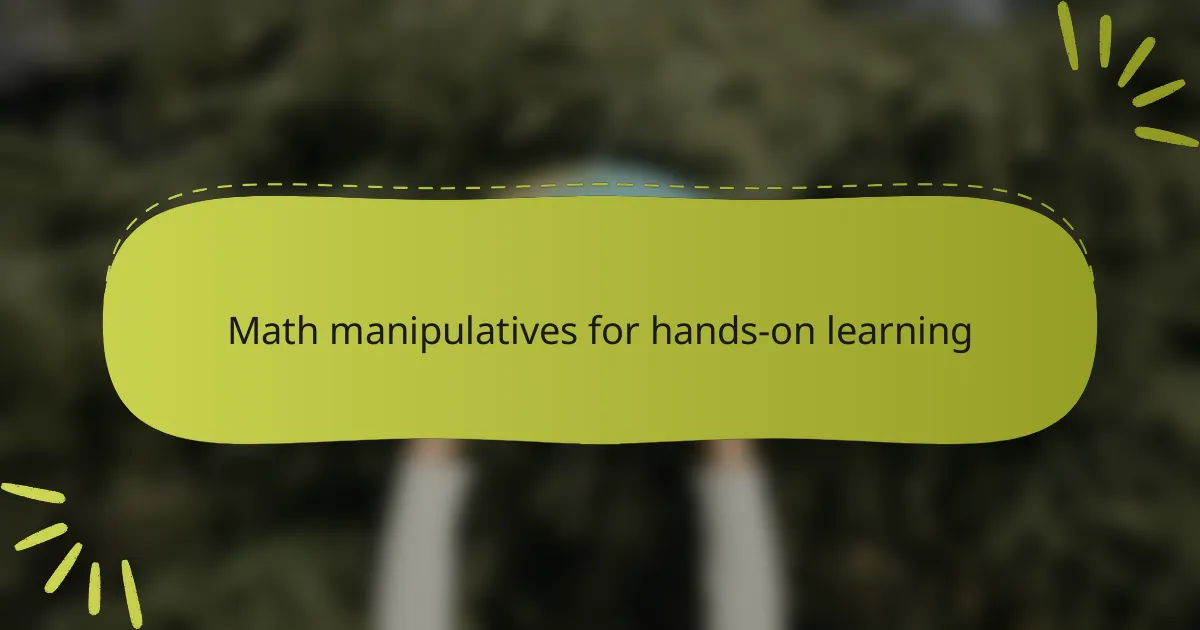Math podcasts are audio programs designed to enhance understanding of mathematical concepts and teaching strategies while addressing educational trends. They serve as valuable resources for educators, offering expert interviews, practical tips, and innovative ideas for classroom implementation. Various types of math podcasts cater to different interests, including educational, conversational, research-based, and specialized content. By integrating these podcasts into lesson plans, educators can facilitate deeper engagement and improve student learning outcomes, as research indicates that multimedia resources enhance understanding and retention in math education.
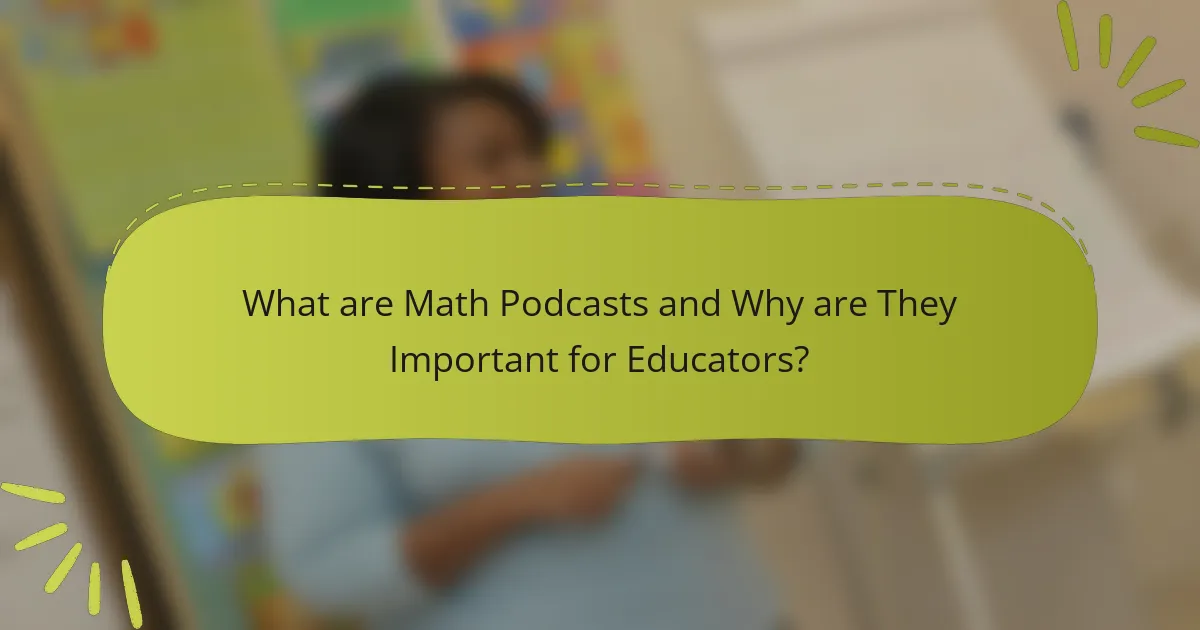
What are Math Podcasts and Why are They Important for Educators?
Math podcasts are audio programs that focus on mathematical concepts, teaching strategies, and educational trends. They provide educators with insights into effective teaching methods and engage listeners with discussions on mathematics. These podcasts often feature expert interviews, practical tips, and innovative ideas for classroom implementation. They are important for educators as they offer convenient access to professional development resources. Educators can listen to them during commutes or breaks, making learning flexible and accessible. Research shows that teachers who engage with ongoing professional development improve their instructional practices. Math podcasts also foster a community of educators sharing experiences and strategies, enhancing collaboration in the teaching profession.
How do Math Podcasts enhance teaching strategies?
Math podcasts enhance teaching strategies by providing accessible content that engages learners. They offer diverse perspectives on mathematical concepts. This variety helps teachers incorporate different teaching styles. Podcasts can include expert interviews, case studies, and real-world applications. These formats make abstract concepts more relatable. Research shows that auditory learning can improve retention and understanding. According to a study by the University of Minnesota, students who engage with podcasts demonstrate higher engagement levels. This engagement can lead to improved academic performance in mathematics.
What specific teaching strategies can be learned from Math Podcasts?
Math podcasts can teach several specific strategies for effective teaching. One strategy is the use of storytelling to enhance engagement. Storytelling in math podcasts helps contextualize mathematical concepts. Another strategy is incorporating real-world applications of math. This approach shows students the relevance of math in everyday life.
Additionally, podcasts often highlight collaborative learning techniques. They encourage discussion and problem-solving among peers. Another effective strategy is the use of visual aids and demonstrations. Math podcasts frequently include visual elements to clarify complex ideas.
Furthermore, podcasts can model differentiated instruction. They showcase various ways to approach a single mathematical concept. Lastly, they provide insights into formative assessment techniques. Educators can learn how to gauge student understanding through informal assessments discussed in podcasts.
How do educators apply insights from Math Podcasts in the classroom?
Educators apply insights from Math Podcasts in the classroom by integrating relevant mathematical concepts and teaching strategies discussed in the episodes. They use podcasts as supplementary resources to enhance lesson plans. Educators often select specific episodes that align with their curriculum goals. They may assign podcast episodes as homework or use them as discussion starters in class.
Additionally, educators encourage students to reflect on the content through guided questions. This approach fosters critical thinking and engagement with mathematical ideas. Research shows that incorporating multimedia resources like podcasts can improve student understanding and retention of complex topics. For example, a study by the Journal of Educational Technology found that students exposed to podcasts demonstrated a 20% increase in math problem-solving skills.
What educational trends are discussed in Math Podcasts?
Math podcasts discuss several educational trends. One trend is the integration of technology in teaching math. This includes using apps and online resources to enhance learning experiences. Another trend is the focus on real-world applications of math concepts. Educators emphasize how math relates to everyday life and various careers. Collaborative learning is also highlighted. Podcasts often feature discussions on group work and peer teaching strategies. Additionally, there is a growing emphasis on differentiated instruction. This approach tailors teaching methods to meet diverse student needs. Finally, podcasts frequently address the importance of fostering a growth mindset in students. This mindset encourages resilience and a positive attitude toward learning math.
Which current educational trends are most relevant to math education?
Current educational trends relevant to math education include personalized learning, integration of technology, and a focus on real-world applications. Personalized learning tailors instruction to meet individual student needs. This approach enhances student engagement and understanding. Integration of technology facilitates interactive learning experiences. Tools like educational software and online resources support diverse learning styles. A focus on real-world applications connects math concepts to everyday life. This relevance helps students see the value of math in practical situations. These trends are supported by research indicating improved student outcomes in math through these methods.
How do these trends impact teaching methodologies?
Trends in educational technology and student engagement significantly impact teaching methodologies. They encourage the integration of multimedia resources, such as podcasts, which enhance learning experiences. Podcasts provide accessible content that can be revisited, allowing for differentiated learning. They also promote active listening and critical thinking skills among students. Furthermore, these trends foster collaborative learning environments, as students can discuss podcast content in groups. Research indicates that incorporating podcasts can lead to improved student performance and engagement. A study by the University of Massachusetts found that students using podcasts showed a 20% increase in understanding complex concepts. Thus, these trends are reshaping traditional teaching approaches to be more interactive and student-centered.
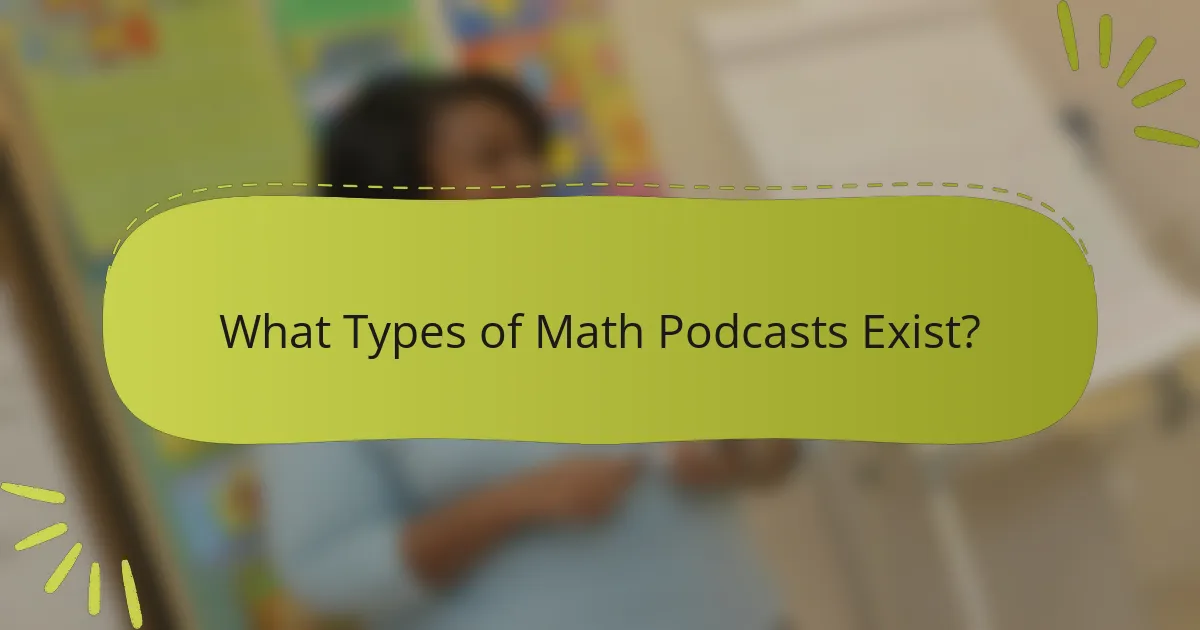
What Types of Math Podcasts Exist?
Educational math podcasts focus on teaching strategies and pedagogy. They often feature expert interviews and practical tips for educators. Popular examples include “Math Ed Podcast” and “Teaching Math.”
Conversational math podcasts present math topics in an engaging format. They may include discussions, storytelling, and humor. “Numberphile” and “The Math Dude” are well-known in this category.
Research-based math podcasts delve into mathematical research and theory. They often discuss recent studies and findings in mathematics education. “The Art of Math” and “Math Mutation” exemplify this type.
Specialized math podcasts target niche areas within mathematics. Topics may include statistics, geometry, or applied math. “Statistics Conversations” and “Geometry Junkies” serve this audience effectively.
Overall, these diverse types of math podcasts cater to various interests and educational needs.
What are the key categories of Math Podcasts?
Key categories of math podcasts include educational content, interviews with experts, and discussions on current trends. Educational content focuses on teaching strategies and mathematical concepts. Interviews with experts provide insights from educators and mathematicians. Discussions on current trends address innovations and challenges in math education. These categories help listeners engage with various aspects of mathematics. They cater to different audiences, including teachers, students, and math enthusiasts. Each category contributes to a comprehensive understanding of mathematics in education.
Which podcasts focus on teaching strategies specifically?
Podcasts that focus on teaching strategies specifically include “Teaching in Higher Ed,” “The EdSurge Podcast,” and “The Art of Education Podcast.” These podcasts explore various educational techniques and methodologies. “Teaching in Higher Ed” discusses innovative teaching practices for higher education. “The EdSurge Podcast” covers trends and strategies in education technology. “The Art of Education Podcast” focuses on art education and effective teaching strategies in that field. Each of these podcasts provides insights and practical advice for educators seeking to improve their teaching methods.
What podcasts highlight educational trends in mathematics?
Podcasts that highlight educational trends in mathematics include “Math Ed Podcast,” “The Math Teaching Podcast,” and “NCTM’s Math Ed Podcast.” “Math Ed Podcast” focuses on current research and practices in math education. It features interviews with educators and researchers. “The Math Teaching Podcast” discusses practical teaching strategies and trends in the field. It includes conversations with experienced math teachers. “NCTM’s Math Ed Podcast” is produced by the National Council of Teachers of Mathematics. It addresses contemporary issues and innovations in math education. Each of these podcasts provides valuable insights into teaching strategies and educational trends in mathematics.
How can educators choose the right Math Podcast for their needs?
Educators can choose the right Math Podcast by identifying their specific teaching needs. They should consider the podcast’s focus, such as teaching strategies or educational trends. Evaluating the host’s expertise in mathematics education is also crucial. Checking listener reviews can provide insights into the podcast’s effectiveness. Additionally, educators should assess the podcast’s format and length for compatibility with their schedules. Exploring episode topics ensures relevance to their curriculum. Finally, subscribing to a few podcasts allows for comparison and selection of the most beneficial ones.
What criteria should educators consider when selecting a Math Podcast?
Educators should consider content relevance, pedagogical approach, and audience engagement when selecting a Math Podcast. Content relevance ensures the topics align with curriculum standards and learning objectives. The pedagogical approach should reflect effective teaching strategies, such as inquiry-based learning or problem-solving techniques. Audience engagement is crucial; podcasts should be interactive and foster a community of learners. Additionally, educators should assess the host’s expertise and the podcast’s production quality. High-quality audio and clear communication enhance listener experience. Lastly, reviews and recommendations from other educators can provide valuable insights into the podcast’s effectiveness.
How can the format of a podcast influence its effectiveness for educators?
The format of a podcast significantly influences its effectiveness for educators. Different formats, such as interviews, narrative storytelling, or panel discussions, cater to various learning styles. For instance, interview formats allow educators to gain insights from experts, enhancing knowledge acquisition. Narrative storytelling can make complex mathematical concepts more relatable and engaging. Additionally, panel discussions foster diverse perspectives, encouraging critical thinking among educators. Research shows that podcasts with structured formats improve retention of information. According to a study by the University of Pennsylvania, structured audio content increases listener engagement by 30%. This suggests that thoughtfully designed podcast formats can enhance educational outcomes for teachers.
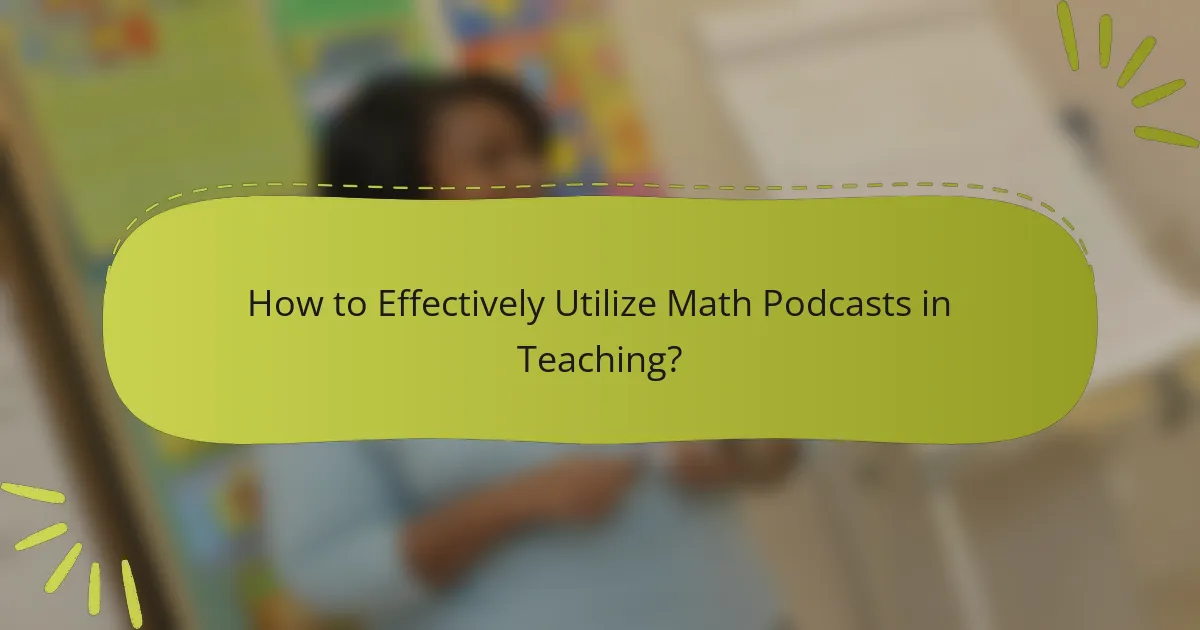
How to Effectively Utilize Math Podcasts in Teaching?
To effectively utilize math podcasts in teaching, integrate them into lesson plans as supplementary resources. Select podcasts that align with curriculum topics for relevance. Encourage students to listen to episodes before class discussions. This prepares them for deeper engagement. Use specific episodes to introduce complex concepts or real-world applications. Facilitate group discussions to explore insights gained from the podcasts. Incorporate assignments that require students to reflect on podcast content. Research shows that multimedia resources enhance understanding and retention in math education. Studies indicate that students who engage with audio content often demonstrate improved problem-solving skills.
What are best practices for integrating Math Podcasts into lesson plans?
Integrating math podcasts into lesson plans enhances student engagement and understanding. First, select podcasts that align with curriculum goals. This ensures content relevance and educational value. Next, create guided listening activities. These can include discussion questions or reflection prompts. This encourages active participation and critical thinking. Additionally, incorporate follow-up activities. These might involve projects or problem-solving sessions based on podcast content. This reinforces learning through application. Lastly, assess student understanding. Use quizzes or group discussions to evaluate comprehension. Research shows that multimedia resources can improve retention rates in educational settings.
How can educators create engaging activities based on podcast content?
Educators can create engaging activities based on podcast content by integrating interactive discussions and hands-on projects. They can facilitate group discussions that encourage students to share insights from the podcast. This method promotes critical thinking and collaborative learning. Additionally, educators can design projects that allow students to apply concepts learned in the podcast. For example, students could create their own math problems inspired by the podcast’s themes.
Incorporating multimedia tools can enhance engagement. Educators can have students create visual presentations or infographics summarizing podcast content. This approach caters to different learning styles and promotes creativity. Furthermore, incorporating quizzes or reflection journals can help assess comprehension. These activities not only reinforce learning but also foster a deeper connection to the material.
Research shows that active learning strategies, like those mentioned, improve retention and understanding in students. Engaging with content through various formats enhances the educational experience.
What strategies can be used to facilitate discussions around podcast themes?
Engaging discussions around podcast themes can be facilitated through several strategies. First, creating a structured outline for each episode helps guide the conversation. This ensures that key topics are covered systematically. Second, incorporating listener questions or feedback encourages audience participation. This method fosters a sense of community and investment in the content. Third, inviting expert guests can provide diverse perspectives. Their insights often spark deeper discussions and enhance the podcast’s credibility. Fourth, using social media platforms to promote episodes allows for real-time interaction. This can lead to ongoing conversations beyond the podcast itself. Lastly, summarizing key points at the end of each episode reinforces learning and encourages reflection. These strategies collectively enhance engagement and deepen understanding of podcast themes.
What are common challenges educators face when using Math Podcasts?
Common challenges educators face when using Math Podcasts include accessibility issues, content relevance, and engagement levels. Accessibility can be a barrier for students with hearing impairments or limited internet access. Content relevance may vary, as some podcasts might not align with specific curriculum standards. Engagement levels can fluctuate, with some students finding it difficult to stay focused during audio-only formats. Additionally, the lack of interactive elements can limit active learning. Educators might also struggle to integrate podcasts effectively into lesson plans, requiring additional preparation time. These challenges can hinder the overall effectiveness of podcasts as educational tools.
How can educators overcome technical issues related to podcast access?
Educators can overcome technical issues related to podcast access by ensuring reliable internet connectivity. This can be achieved by using wired connections instead of Wi-Fi. Additionally, educators should provide access to multiple platforms for listening. This includes options like web browsers, mobile apps, and downloadable files.
Furthermore, offering technical support resources can assist users in troubleshooting issues. Clear instructions on how to access and use podcasts should be provided. Regularly updating podcast software can also prevent access problems.
Incorporating feedback from users can help identify recurring technical issues. Finally, collaborating with IT departments can ensure that technical barriers are minimized.
What methods can be implemented to ensure student engagement with podcasts?
Incorporating interactive elements can significantly enhance student engagement with podcasts. Methods include asking students to submit questions before episodes, which can be addressed during the podcast. This creates a sense of involvement and ownership. Additionally, integrating quizzes or reflection prompts related to podcast content encourages active listening. Research shows that active participation increases retention rates by up to 30%. Using social media platforms for discussions around podcast topics fosters a community feel. Engaging students with guest speakers from their field of interest can also spark curiosity. Finally, providing opportunities for students to create their own podcasts allows them to express their understanding creatively.
What are some recommended Math Podcasts for educators seeking insights?
“Math Ed Podcast” offers insights into teaching practices and interviews with educators. “The Math Teacher Lounge” discusses strategies and challenges in math education. “NCTM’s Math Ed Podcast” features conversations about current trends in mathematics teaching. “Math Mutation” explores math concepts and their applications in everyday life. “The Numberphile Podcast” investigates interesting mathematical ideas and their relevance. Each of these podcasts provides valuable resources for educators seeking to enhance their teaching strategies.
Which Math Podcasts have received positive reviews from educators?
“Math Ed Podcast” and “The Teaching Math Podcast” have received positive reviews from educators. “Math Ed Podcast” focuses on research-based teaching strategies. Educators appreciate its insights into effective math instruction. “The Teaching Math Podcast” features discussions with experienced math teachers. It provides practical tips and strategies for classroom application. Both podcasts are praised for their relevance and educational value. They are frequently recommended in educator forums and reviews.
How can educators find new and trending Math Podcasts to follow?
Educators can find new and trending Math Podcasts by exploring various online platforms. Popular podcast directories like Apple Podcasts, Spotify, and Google Podcasts feature trending categories. Educators can also join math education forums and social media groups for recommendations. Websites like Edutopia and Education Week often publish lists of top educational podcasts. Following influential educators and mathematicians on social media can provide insights into their favorite podcasts. Additionally, subscribing to newsletters from educational organizations can highlight new podcast releases. Engaging with professional development webinars may also introduce educators to noteworthy podcasts.
Math podcasts serve as valuable audio resources that focus on teaching strategies and educational trends in mathematics. They provide educators with insights into effective instructional methods, expert interviews, and practical tips for classroom implementation. Key topics include enhancing teaching strategies, applying insights from podcasts in the classroom, and exploring current educational trends relevant to math education. Additionally, the article covers various types of math podcasts, criteria for selecting them, and best practices for integrating them into lesson plans, ultimately highlighting their role in fostering professional development and collaboration among educators.
